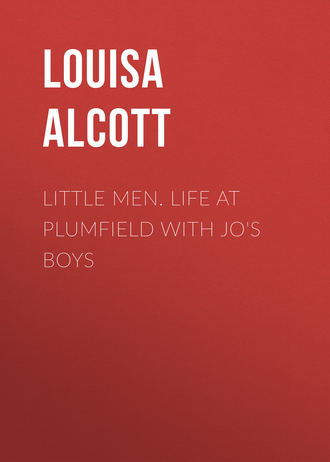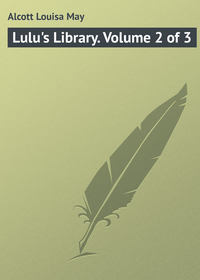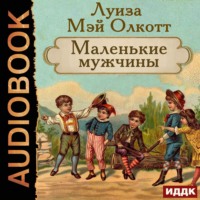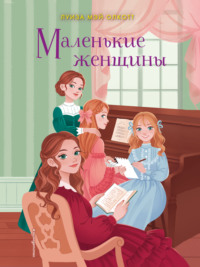 полная версия
полная версияLittle Men. Life at Plumfield with Jo's Boys
“Why, he could make birds come to him, and rabbits and squirrels didn’t mind him any more than if he was a tree. He never hurt ’em, and they seemed to know him. Did you ever tickle a lizard with a straw?” asked Dan, eagerly.
“No, but I should like to try it.”
“Well, I’ve done it, and it’s so funny to see ’em turn over and stretch out, they like it so much. Mr. Hyde used to do it; and he’d make snakes listen to him while he whistled, and he knew just when certain flowers would blow, and bees wouldn’t sting him, and he’d tell the wonderfullest things about fish and flies, and the Indians and the rocks.”
“I think you were so fond of going with Mr. Hyde, you rather neglected Mr. Page,” said Mrs. Jo, slyly.
“Yes, I did; I hated to have to weed and hoe when I might be tramping round with Mr. Hyde. Page thought such things silly, and called Mr. Hyde crazy because he’d lay hours watching a trout or a bird.”
“Suppose you say lie instead of lay, it is better grammar,” said Mrs. Jo, very gently; and then added, “Yes, Page is a thorough farmer, and would not understand that a naturalist’s work was just as interesting, and perhaps just as important as his own. Now, Dan, if you really love these things, as I think you do, and I am glad to see it, you shall have time to study them and books to help you; but I want you to do something besides, and to do it faithfully, else you will be sorry by and by, and find that you have got to begin again.”
“Yes, ma’am,” said Dan, meekly, and looked a little scared by the serious tone of the last remarks, for he hated books, yet had evidently made up his mind to study anything she proposed.
“Do you see that cabinet with twelve drawers in it?” was the next very unexpected question.
Dan did see two tall old-fashioned ones standing on either side of the piano; he knew them well, and had often seen nice bits of string, nails, brown paper, and such useful matters come out of the various drawers. He nodded and smiled. Mrs. Jo went on, —
“Well, don’t you think those drawers would be good places to put your eggs, and stones, and shells, and lichens?”
“Oh, splendid, but you wouldn’t like my things ‘clutterin’ round,’ as Mr. Page used to say, would you?” cried Dan, sitting up to survey the old piece of furniture with sparkling eyes.
“I like litter of that sort; and if I didn’t, I should give you the drawers, because I have a regard for children’s little treasures, and think they should be treated respectfully. Now, I am going to make a bargain with you, Dan, and I hope you will keep it honorably. Here are twelve good-sized drawers, one for each month of the year, and they shall be yours as fast as you earn them, by doing the little duties that belong to you. I believe in rewards of a certain kind, especially for young folks; they help us along and though we may begin by being good for the sake of the reward, if it is rightly used, we shall soon learn to love goodness for itself.”
“Do you have ’em?” asked Dan, looking as if this was new talk for him.
“Yes, indeed! I haven’t learnt to get on without them yet. My rewards are not drawers, or presents, or holidays, but they are things which I like as much as you do the others. The good behavior and success of my boys is one of the rewards I love best, and I work for it as I want you to work for your cabinet. Do what you dislike, and do it well, and you get two rewards, – one, the prize you see and hold; the other, the satisfaction of a duty cheerfully performed. Do you understand that?”
“Yes, ma’am.”
“We all need these little helps; so you shall try to do your lessons and your work, play kindly with all the boys, and use your holidays well; and if you bring me a good report, or if I see and know it without words – for I’m quick to spy out the good little efforts of my boys – you shall have a compartment in the drawer for your treasures. See, some are already divided into four parts, and I will have the others made in the same way, a place for each week; and when the drawer is filled with curious and pretty things, I shall be as proud of it as you are; prouder, I think – for in the pebbles, mosses, and gay butterflies, I shall see good resolutions carried out, conquered faults, and a promise well kept. Shall we do this, Dan?”
The boy answered with one of the looks which said much, for it showed that he felt and understood her wish and words, although he did not know how to express his interest and gratitude for such care and kindness. She understood the look, and seeing by the color that flushed up to his forehead that he was touched, as she wished him to be, she said no more about that side of the new plan, but pulled out the upper drawer, dusted it, and set it on two chairs before the sofa, saying briskly, —
“Now, let us begin at once by putting those nice beetles in a safe place. These compartments will hold a good deal, you see. I’d pin the butterflies and bugs round the sides; they will be quite safe there, and leave room for the heavy things below. I’ll give you some cotton wool, and clean paper and pins, and you can get ready for the week’s work.”
“But I can’t go out to find any new things,” said Dan, looking piteously at his foot.
“That’s true; never mind, we’ll let these treasures do for this week, and I dare say the boys will bring you loads of things if you ask them.”
“They don’t know the right sort; besides, if I lay, no, lie here all the time, I can’t work and study, and earn my drawers.”
“There are plenty of lessons you can learn lying there, and several little jobs of work you can do for me.”
“Can I?” and Dan looked both surprised and pleased.
“You can learn to be patient and cheerful in spite of pain and no play. You can amuse Teddy for me, wind cotton, read to me when I sew, and do many things without hurting your foot, which will make the days pass quickly, and not be wasted ones.”
Here Demi ran in with a great butterfly in one hand, and a very ugly little toad in the other.
“See, Dan, I found them, and ran back to give them to you; aren’t they beautiful ones?” panted Demi, all out of breath.
Dan laughed at the toad, and said he had no place to put him, but the butterfly was a beauty, and if Mrs. Jo would give him a big pin, he would stick it right up in the drawer.
“I don’t like to see the poor thing struggle on a pin; if it must be killed, let us put it out of pain at once with a drop of camphor,” said Mrs. Jo, getting out the bottle.
“I know how to do it – Mr. Hyde always killed ’em that way – but I didn’t have any camphor, so I use a pin,” and Dan gently poured a drop on the insect’s head, when the pale green wings fluttered an instant, and then grew still.
This dainty little execution was hardly over when Teddy shouted from the bedroom, “Oh, the little trabs are out, and the big one’s eaten ’em all up.” Demi and his aunt ran to the rescue, and found Teddy dancing excitedly in a chair, while two little crabs were scuttling about the floor, having got through the wires of the cage. A third was clinging to the top of the cage, evidently in terror of his life, for below appeared a sad yet funny sight. The big crab had wedged himself into the little recess where Polly’s cup used to stand, and there he sat eating one of his relations in the coolest way. All the claws of the poor victim were pulled off, and he was turned upside down, his upper shell held in one claw close under the mouth of the big crab like a dish, while he leisurely ate out of it with the other claw, pausing now and then to turn his queer bulging eyes from side to side, and to put out a slender tongue and lick them in a way that made the children scream with laughter. Mrs. Jo carried the cage in for Dan to see the sight, while Demi caught and confined the wanderers under an inverted wash-bowl.
“I’ll have to let these fellers go, for I can’t keep ’em in the house,” said Dan, with evident regret.
“I’ll take care of them for you, if you will tell me how, and they can live in my turtle-tank just as well as not,” said Demi, who found them more interesting even than his beloved slow turtles. So Dan gave him directions about the wants and habits of the crabs, and Demi bore them away to introduce them to their new home and neighbors. “What a good boy he is!” said Dan, carefully settling the first butterfly, and remembering that Demi had given up his walk to bring it to him.
“He ought to be, for a great deal has been done to make him so.”
“He’s had folks to tell him things, and to help him; I haven’t,” said Dan, with a sigh, thinking of his neglected childhood, a thing he seldom did, and feeling as if he had not had fair play somehow.
“I know it, dear, and for that reason I don’t expect as much from you as from Demi, though he is younger; you shall have all the help that we can give you now, and I hope to teach you how to help yourself in the best way. Have you forgotten what Father Bhaer told you when you were here before, about wanting to be good, and asking God to help you?”
“No, ma’am,” very low.
“Do you try that way still?”
“No, ma’am,” lower still.
“Will you do it every night to please me?”
“Yes, ma’am,” very soberly.
“I shall depend on it, and I think I shall know if you are faithful to your promise, for these things always show to people who believe in them, though not a word is said. Now here is a pleasant story about a boy who hurt his foot worse than you did yours; read it, and see how bravely he bore his troubles.”
She put that charming little book, “The Crofton Boys,” into his hands, and left him for an hour, passing in and out from time to time that he might not feel lonely. Dan did not love to read, but soon got so interested that he was surprised when the boys came home. Daisy brought him a nosegay of wild flowers, and Nan insisted on helping bring him his supper, as he lay on the sofa with the door open into the dining-room, so that he could see the lads at table, and they could nod socially to him over their bread and butter.
Mr. Bhaer carried him away to his bed early, and Teddy came in his night-gown to say good-night, for he went to his little nest with the birds.
“I want to say my prayers to Danny; may I?” he asked; and when his mother said, “Yes,” the little fellow knelt down by Dan’s bed, and folding his chubby hands, said softly, —
“Pease Dod bess everybody, and hep me to be dood.”
Then he went away smiling with sleepy sweetness over his mother’s shoulder.
But after the evening talk was done, the evening song sung, and the house grew still with beautiful Sunday silence, Dan lay in his pleasant room wide awake, thinking new thoughts, feeling new hopes and desires stirring in his boyish heart, for two good angels had entered in: love and gratitude began the work which time and effort were to finish; and with an earnest wish to keep his first promise, Dan folded his hands together in the darkness, and softly whispered Teddy’s little prayer, —
“Please God bless every one, and help me to be good.”
CHAPTER XI
UNCLE TEDDY
For a week Dan only moved from bed to sofa; a long week and a hard one, for the hurt foot was very painful at times, the quiet days very wearisome to the active lad, longing to be out enjoying the summer weather, and especially difficult was it to be patient. But Dan did his best, and every one helped him in their various ways; so the time passed, and he was rewarded at last by hearing the doctor say, on Saturday morning, —
“This foot is doing better than I expected. Give the lad the crutch this afternoon, and let him stump about the house a little.”
“Hooray!” shouted Nat, and raced away to tell the other boys the good news.
Everybody was very glad, and after dinner the whole flock assembled to behold Dan crutch himself up and down the hall a few times before he settled in the porch to hold a sort of levée. He was much pleased at the interest and good-will shown him, and brightened up more and more every minute; for the boys came to pay their respects, the little girls fussed about him with stools and cushions, and Teddy watched over him as if he was a frail creature unable to do any thing for himself. They were still sitting and standing about the steps, when a carriage stopped at the gate, a hat was waved from it, and with a shout of “Uncle Teddy! Uncle Teddy!” Rob scampered down the avenue as fast as his short legs would carry him. All the boys but Dan ran after him to see who should be first to open the gate, and in a moment the carriage drove up with boys swarming all over it, while Uncle Teddy sat laughing in the midst, with his little daughter on his knee.
“Stop the triumphal car and let Jupiter descend,” he said, and jumping out ran up the steps to meet Mrs. Bhaer, who stood smiling and clapping her hands like a girl.
“How goes it, Teddy?”
“All right, Jo.”
Then they shook hands, and Mr. Laurie put Bess into her aunt’s arms, saying, as the child hugged her tight, “Goldilocks wanted to see you so much that I ran away with her, for I was quite pining for a sight of you myself. We want to play with your boys for an hour or so, and to see how ‘the old woman who lived in a shoe, and had so many children she did not know what to do,’ is getting on.”
“I’m so glad! Play away, and don’t get into mischief,” answered Mrs. Jo, as the lads crowded round the pretty child, admiring her long golden hair, dainty dress, and lofty ways, for the little “Princess,” as they called her, allowed no one to kiss her, but sat smiling down upon them, and graciously patting their heads with her little, white hands. They all adored her, especially Rob, who considered her a sort of doll, and dared not touch her lest she should break, but worshipped her at a respectful distance, made happy by an occasional mark of favor from her little highness. As she immediately demanded to see Daisy’s kitchen, she was borne off by Mrs. Jo, with a train of small boys following. The others, all but Nat and Demi, ran away to the menagerie and gardens to have all in order; for Mr. Laurie always took a general survey, and looked disappointed if things were not flourishing.
Standing on the steps, he turned to Dan, saying like an old acquaintance, though he had only seen him once or twice before, —
“How is the foot?”
“Better, sir.”
“Rather tired of the house, aren’t you?”
“Guess I am!” and Dan’s eyes roved away to the green hills and woods where he longed to be.
“Suppose we take a little turn before the others come back? That big, easy carriage will be quite safe and comfortable, and a breath of fresh air will do you good. Get a cushion and a shawl, Demi, and let’s carry Dan off.”
The boys thought it a capital joke, and Dan looked delighted, but asked, with an unexpected burst of virtue, —
“Will Mrs. Bhaer like it?”
“Oh, yes; we settled all that a minute ago.”
“You didn’t say any thing about it, so I don’t see how you could,” said Demi, inquisitively.
“We have a way of sending messages to one another, without any words. It is a great improvement on the telegraph.”
“I know – it’s eyes; I saw you lift your eyebrows, and nod toward the carriage, and Mrs. Bhaer laughed and nodded back again,” cried Nat, who was quite at his ease with kind Mr. Laurie by this time.
“Right. Now then, come on,” and in a minute Dan found himself settled in the carriage, his foot on a cushion on the seat opposite, nicely covered with a shawl, which fell down from the upper regions in a most mysterious manner, just when they wanted it. Demi climbed up to the box beside Peter, the black coachman. Nat sat next Dan in the place of honor, while Uncle Teddy would sit opposite, – to take care of the foot, he said, but really that he might study the faces before him – both so happy, yet so different, for Dan’s was square, and brown, and strong, while Nat’s was long, and fair, and rather weak, but very amiable with its mild eyes and good forehead.
“By the way, I’ve got a book somewhere here that you may like to see,” said the oldest boy of the party, diving under the seat and producing a book which made Dan exclaim, —
“Oh! by George, isn’t that a stunner?” as he turned the leaves, and saw fine plates of butterflies, and birds, and every sort of interesting insect, colored like life. He was so charmed that he forgot his thanks, but Mr. Laurie did not mind, and was quite satisfied to see the boy’s eager delight, and to hear his exclamations over certain old friends as he came to them. Nat leaned on his shoulder to look, and Demi turned his back to the horses, and let his feet dangle inside the carriage, so that he might join in the conversation.
When they got among the beetles, Mr. Laurie took a curious little object out of his vest-pocket, and laying it in the palm of his hand, said, —
“There’s a beetle that is thousands of years old;” and then, while the lads examined the queer stone-bug, that looked so old and gray, he told them how it came out of the wrappings of a mummy, after lying for ages in a famous tomb. Finding them interested, he went on to tell about the Egyptians, and the strange and splendid ruins they have left behind them – the Nile, and how he sailed up the mighty river, with the handsome dark men to work his boat; how he shot alligators, saw wonderful beasts and birds; and afterwards crossed the desert on a camel, who pitched him about like a ship in a storm.
“Uncle Teddy tells stories ’most as well as Grandpa,” said Demi, approvingly, when the tale was done, and the boys’ eyes asked for more.
“Thank you,” said Mr. Laurie, quite soberly, for he considered Demi’s praise worth having, for children are good critics in such cases, and to suit them is an accomplishment that any one may be proud of.
“Here’s another trifle or two that I tucked into my pocket as I was turning over my traps to see if I had any thing that would amuse Dan,” and Uncle Teddy produced a fine arrow-head and a string of wampum.
“Oh! tell about the Indians,” cried Demi, who was fond of playing wigwam.
“Dan knows lots about them,” added Nat.
“More than I do, I dare say. Tell us something,” and Mr. Laurie looked as interested as the other two.
“Mr. Hyde told me; he’s been among ’em, and can talk their talk, and likes ’em,” began Dan, flattered by their attention, but rather embarrassed by having a grown-up listener.
“What is wampum for?” asked curious Demi, from his perch.
The others asked questions likewise, and, before he knew it, Dan was reeling off all Mr. Hyde had told him, as they sailed down the river a few weeks before. Mr. Laurie listened well, but found the boy more interesting than the Indians, for Mrs. Jo had told him about Dan, and he rather took a fancy to the wild lad, who ran away as he himself had often longed to do, and who was slowly getting tamed by pain and patience.
“I’ve been thinking that it would be a good plan for you fellows to have a museum of your own; a place in which to collect all the curious and interesting things that you find, and make, and have given you. Mrs. Jo is too kind to complain, but it is rather hard for her to have the house littered up with all sorts of rattletraps, – half-a-pint of dor-bugs in one of her best vases, for instance, a couple of dead bats nailed up in the back entry, wasps’ nests tumbling down on people’s heads, and stones lying round everywhere, enough to pave the avenue. There are not many women who would stand that sort of thing, are there, now?”
As Mr. Laurie spoke with a merry look in his eyes, the boys laughed and nudged one another, for it was evident that some one told tales out of school, else how could he know of the existence of these inconvenient treasures.
“Where can we put them, then?” said Demi, crossing his legs and leaning down to argue the question.
“In the old carriage-house.”
“But it leaks, and there isn’t any windows, nor any place to put things, and it’s all dust and cobwebs,” began Nat.
“Wait till Gibbs and I have touched it up a bit, and then see how you like it. He is to come over on Monday to get it ready; then next Saturday I shall come out, and we will fix it up, and make the beginning, at least, of a fine little museum. Every one can bring his things, and have a place for them; and Dan is to be the head man, because he knows most about such matters, and it will be quiet, pleasant work for him now that he can’t knock about much.”
“Won’t that be jolly?” cried Nat, while Dan smiled all over his face and had not a word to say, but hugged his book, and looked at Mr. Laurie as if he thought him one of the greatest public benefactors that ever blessed the world.
“Shall I go round again, sir?” asked Peter, as they came to the gate, after two slow turns about the half-mile triangle.
“No, we must be prudent, else we can’t come again. I must go over the premises, take a look at the carriage-house, and have a little talk with Mrs. Jo before I go”; and, having deposited Dan on his sofa to rest and enjoy his book, Uncle Teddy went off to have a frolic with the lads who were raging about the place in search of him. Leaving the little girls to mess up-stairs, Mrs. Bhaer sat down by Dan, and listened to his eager account of the drive till the flock returned, dusty, warm, and much excited about the new museum, which every one considered the most brilliant idea of the age.
“I always wanted to endow some sort of an institution, and I am going to begin with this,” said Mr. Laurie, sitting down on a stool at Mrs. Jo’s feet.
“You have endowed one already. What do you call this?” and Mrs. Jo pointed to the happy-faced lads, who had camped upon the floor about them.
“I call it a very promising Bhaer-garden, and I’m proud to be a member of it. Did you know I was the head boy in this school?” he asked, turning to Dan, and changing the subject skilfully, for he hated to be thanked for the generous things he did.
“I thought Franz was!” answered Dan, wondering what the man meant.
“Oh, dear no! I’m the first boy Mrs. Jo ever had to take care of, and I was such a bad one that she isn’t done with me yet, though she has been working at me for years and years.”
“How old she must be!” said Nat, innocently.
“She began early, you see. Poor thing! she was only fifteen when she took me, and I led her such a life, it’s a wonder she isn’t wrinkled and gray, and quite worn out,” and Mr. Laurie looked up at her laughing.
“Don’t, Teddy; I won’t have you abuse yourself so;” and Mrs. Jo stroked the curly black head at her knee as affectionately as ever, for, in spite of every thing, Teddy was her boy still.
“If it hadn’t been for you, there never would have been a Plumfield. It was my success with you, sir, that gave me courage to try my pet plan. So the boys may thank you for it, and name the new institution ‘The Laurence Museum,’ in honor of its founder, – won’t we, boys?” she added, looking very like the lively Jo of old times.
“We will! we will!” shouted the boys, throwing up their hats, for though they had taken them off on entering the house, according to rule, they had been in too much of a hurry to hang them up.
“I’m as hungry as a bear, can’t I have a cookie?” asked Mr. Laurie, when the shout subsided and he had expressed his thanks by a splendid bow.
“Trot out and ask Asia for the gingerbread-box, Demi. It isn’t in order to eat between meals, but, on this joyful occasion, we won’t mind, and have a cookie all round,” said Mrs. Jo; and when the box came she dealt them out with a liberal hand, every one munching away in a social circle.
Suddenly, in the midst of a bite, Mr. Laurie cried out, “Bless my heart, I forgot grandma’s bundle!” and running out to the carriage, returned with an interesting white parcel, which, being opened, disclosed a choice collection of beasts, birds, and pretty things cut out of crisp sugary cake, and baked a lovely brown.
“There’s one for each, and a letter to tell which is whose. Grandma and Hannah made them, and I tremble to think what would have happened to me if I had forgotten to leave them.”
Then, amid much laughing and fun, the cakes were distributed. A fish for Dan, a fiddle for Nat, a book for Demi, a monkey for Tommy, a flower for Daisy, a hoop for Nan, who had driven twice round the triangle without stopping, a star for Emil, who put on airs because he studied astronomy, and, best of all, an omnibus for Franz, whose great delight was to drive the family bus. Stuffy got a fat pig, and the little folks had birds, and cats, and rabbits, with black currant eyes.









